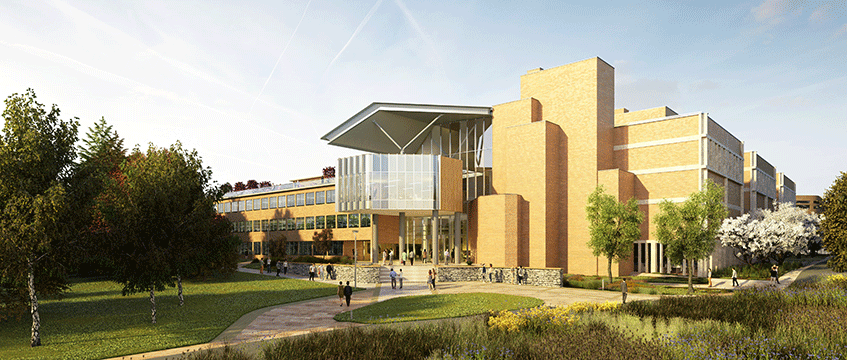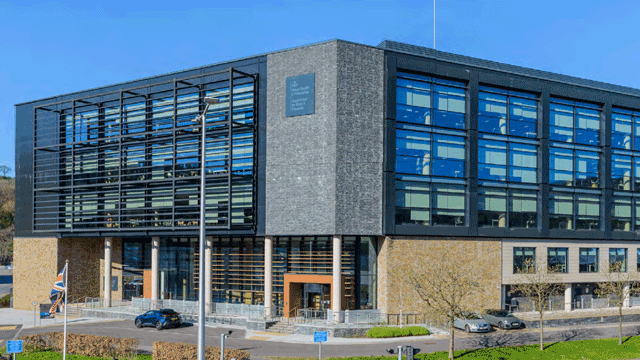Bruntwood SciTech will re-open part of its Alderley Park life sciences campus in Cheshire next week, having fitted it out as a coronavirus testing laboratory. The site will be one of three national hubs – the others in Milton Keynes and Glasgow – dedicated to investigating the disease.
As the world is gripped by the Covid-19 pandemic, providing good-quality medical care and advancing scientific investigation into mitigating the spread of such diseases is more important than ever. And as authorities race to understand and find a vaccine for the virus, the role that property can play to help facilitate research is vital.
The three testing sites being set up will be overseen by Medical Discovery Catapult, which has been instructed by the government to develop an efficient and quick response to health secretary Matt Hancock’s target of carrying out 100,000 Covid-19 tests a day in England by the end of April.
It took three weeks to set up Alderley Park’s coronavirus testing lab “in challenging circumstances”, says Kath Mackay, Bruntwood SciTech’s managing director for the campus. The government has invested £400,000 in the laboratory and trialling initial testing. More investment will be needed to upscale operations.
“This is a time when we need to be investing into life sciences and technology, and the current pandemic has shown that,” McKay says. “We will continue to invest in the facilities and infrastructure that the sector needs not only to get through the current crisis, but we need to make sure we emerge from this on a really firm footing to support our current companies and the new ones that will come and join us.”
Pent-up demand
During the first quarter of this year, global venture capital investment into life sciences companies reached a four-year high. According to data collected by Savills, VCs pumped £7.5bn into biotechnology, pharmaceutical and oncology companies, the highest amount invested into this space since the start of 2016, when £8.18bn was invested.
The lion’s share of investment was accounted for by a £5bn VC investment into a South Korean life sciences company – an unprecedented deal, according to Savills research director Steven Lang.
After companies receive funding, agents say it takes, on average, six to 12 months for new real estate requirements to emerge from companies’ expansion.
Lang says it is too early to say whether the recent spike in investment was influenced by coronavirus, but he says he’s seen a general pick-up of interest in life science properties as an asset class over the past six months and predicts this will only increase. Interest has been shown from big investors, global funds and US life sciences REITs.
“There could be millions of square feet of pent-up demand that will be created just in the UK as a result of corporate deals and life sciences interest generally,” Lang adds.
Medical resilience
William Cooper, partner and co-founder of Harwell Oxford Partners, says he has seen a “massive” increase in requirements and demand for life sciences space as a result of the pandemic.
Its Harwell Campus park recently received a major funding boost, with Brookfield Asset Management acquiring a 50% stake for £44m.
A £67m vaccine manufacturing and innovation centre is currently being built on the campus, and as a result of coronavirus, the developer is pushing forward the scheme “a lot quicker than it otherwise would have been”, Cooper says.
He predicts that more than £100m of private and public sector investment will be pumped into scaling up the centre, and says coronavirus will only accelerate these plans. Likewise, he believes investment in creating more vaccine centre assets across the country will only rise.
“We’ve seen what one small virus can do,” Cooper says. “We need to spend a lot on medical resilience, and part of that will [come from] the private sector. But the public sector needs to step in to support and be the catalyst to get things happening. There will definitely be a lot of investment into those fields in the coming years.”
Lang expects a growing need to build more vaccine centres – in the UK and globally – as VC investment into vaccine companies continues to grow. Savills data shows the US has seen the most amount of money invested into vaccine companies, up by 236% to £2.91bn in 2015-2019, compared with £870m between 2010-2015.
At Legal & General, a 50:50 joint venture partner in the Bruntwood SciTech initiative, John Cummins, managing director of Future Cities, says the life sciences sector will only continue to grow after the world emerges from the coronavirus lockdown.
“During these unprecedented times, the importance of science and technology hubs is being brought to the fore,” he says, adding that property has an important role to play in investing in this space to ensure the UK remains “a centre of excellence”.
“Never has this been more vital,” Cummins adds, “allowing the UK to rise to tackle the growing crisis head-on, while supporting regional economic growth and ensuring the UK economy is prepared to meet future threats.”
To send feedback, e-mail lucy.alderson@egi.co.uk or tweet @LucyAJourno or @estatesgazette











